中考英语专题复习 反义疑问句
九年级复习:反义疑问句的14种常考特殊用法
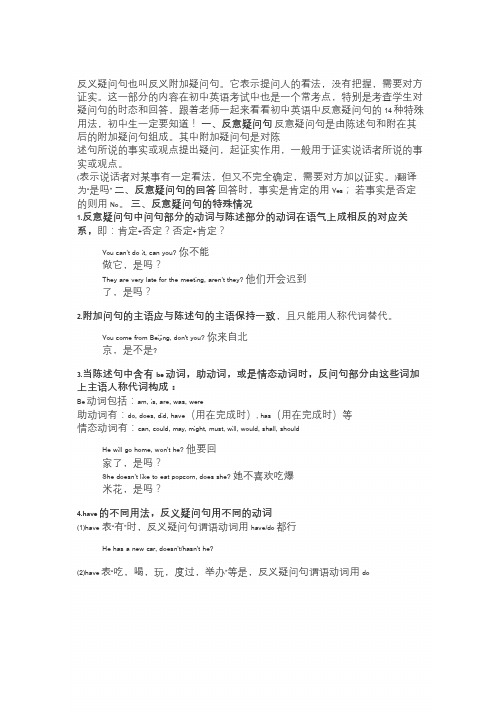
反义疑问句也叫反义附加疑问句。
它表示提问人的看法,没有把握,需要对方证实。
这一部分的内容在初中英语考试中也是一个常考点,特别是考查学生对疑问句的时态和回答,跟着老师一起来看看初中英语中反意疑问句的14种特殊用法,初中生一定要知道!一、反意疑问句反意疑问句是由陈述句和附在其后的附加疑问句组成。
其中附加疑问句是对陈述句所说的事实或观点提出疑问,起证实作用,一般用于证实说话者所说的事实或观点。
(表示说话者对某事有一定看法,但又不完全确定,需要对方加以证实。
)翻译为“是吗” 二、反意疑问句的回答回答时,事实是肯定的用Yes;若事实是否定的则用No。
三、反意疑问句的特殊情况1.反意疑问句中问句部分的动词与陈述部分的动词在语气上成相反的对应关系,即:肯定+否定?否定+肯定?You can’t do it, can you? 你不能做它,是吗?They are very late for the meeting, aren’t they? 他们开会迟到了,是吗?2.附加问句的主语应与陈述句的主语保持一致,且只能用人称代词替代。
You come from Beijing, don't you? 你来自北京,是不是?3.当陈述句中含有be动词,助动词,或是情态动词时,反问句部分由这些词加上主语人称代词构成:Be动词包括:am, is, are, was, were助动词有:do, does, did, have(用在完成时), has(用在完成时)等情态动词有:can, could, may, might, must, will, would, shall, shouldHe will go home, won’t he? 他要回家了,是吗?She doesn’t like to eat popcorn, does she? 她不喜欢吃爆米花,是吗?4.have的不同用法,反义疑问句用不同的动词(1)have 表“有”时,反义疑问句谓语动词用have/do都行He has a new car, doesn’t/hasn’t he?(2)have表“吃,喝,玩,度过,举办”等是,反义疑问句谓语动词用doHe has supper at home every day, doesn’t he?They had a good time in Beijing, didn’t they?(3)have to表“不得不,必须”时,反义疑问句谓语动词用doKite has to help her mother, doesn’t she?(4)had better表“最好”时,反义疑问句谓语动词用hadWe had better go to school at once, hadn't we?(5)have用在完成时中,反义疑问句谓语动词用haveThey have known the matter, haven’t they?5.(1)反意疑问句的陈述部分带有little, few, never, hardly, seldom,nobody,nothing, no one, none, neither等否定意义的词时,问句部分用肯定式。
2024年中考英语复习反义疑问句课件

肯定回答和否定回答
1、The girls like listening to popular music,___d_o_n_’t__th_e_y____? 这些女孩喜欢听流行音乐,不是吗? 肯定回答:__Y_e_s,__th_e_y__d_o___.是的,她们喜欢。 否定回答:__N_o_,_t_h_e_y_d_o_n_’t__.不,她们不喜欢。
Somebody phoned while I was out, didn’t they?
Everyone enjoyed the party, didn’t they?
Nobody wants to go there, does he?
3、当陈述部分的主语是不定代词 everything, nothing, anything, something 时,附加 疑问句中的主语一般用it,不用 they。
6. 如果陈述部分用I’m…结构,附加疑问部分 一般用aren’t I 。 I am strong and healthy, aren’t I? 7. 当陈述句为there be结构时,附加疑问句中的主语也用there。
There’s no help for it, is there? There’s something wrong, isn’t there?
10. 当陈述部分带有情态动词must表示“必须 ”时,疑问部分用needn’t。
You must work hard next term, needn’t you? 但:I must answer the letter, must I?
11. 感叹句后的附加疑问句的谓语动词需用be的现在时,且常用否定形式。 What a clever boy, isn’t he? What a lovely day, isn’t it?
(完整版)中考反义疑问句详解及练习和答案
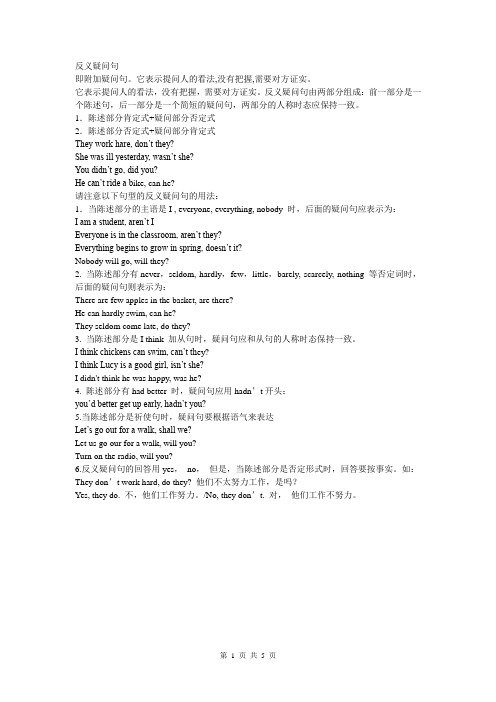
即附加疑问句。
它表示提问人的看法,没有把握,需要对方证实。
它表示提问人的看法,没有把握,需要对方证实。
反义疑问句由两部分组成:前一部分是一个陈述句,后一部分是一个简短的疑问句,两部分的人称时态应保持一致。
1.陈述部分肯定式+疑问部分否定式2.陈述部分否定式+疑问部分肯定式They work hare, don’t they?She was ill yesterday, wasn’t she?You didn’t go, did you?He can’t ride a b ike, can he?请注意以下句型的反义疑问句的用法:1.当陈述部分的主语是I , everyone, everything, nobody 时,后面的疑问句应表示为:I am a student, aren’t IEveryone is in the classroom, aren’t they?Everything begins to grow in spring, doesn’t it?Nobody will go, will they?2. 当陈述部分有never,seldom, hardly,few,little,barely, scarcely, nothing 等否定词时,后面的疑问句则表示为:There are few apples in the basket, are there?He can hardly swim, can he?They seldom come late, do they?3. 当陈述部分是I think 加从句时,疑问句应和从句的人称时态保持一致。
I think chickens can swim, can’t th ey?I think Lucy is a good girl, isn’t she?I didn't think he was happy, was he?4. 陈述部分有had better 时,疑问句应用hadn’t开头:you’d better get up early, hadn’t you?5.当陈述部分是祈使句时,疑问句要根据语气来表达Let’s go out for a walk, shall we?Let us go our for a walk, will you?Turn on the radio, will you?6.反义疑问句的回答用yes,no,但是,当陈述部分是否定形式时,回答要按事实。
反义疑问句知识点详解(初中英语专项复习)3

反义疑问句知识点详解(初中英语专项复习)一、定义反意疑问句又名附加疑问句。
属疑问句的一种,表示说话者对某事有一定看法,但又不完全确定,需要对方加以证实。
二、结构和原则:1.反意疑问句一般分为两个部分:前一个部分陈述句,后一部分为缩略形式的句问。
如:There is a tree in front of the building, isn’t there?2.反意疑问句遵守前肯后否, 前否后肯, 时态一致性的原则.三、用法:一.反意疑问句主语及谓语的确定.1.陈述部分含有never, few ,little,hardly,seldom,rarely(罕见), no,nothing, nobody, none, too…to 等表示否定意义的词时,其附加问句就用肯定形式.There are few people in the room, are there?She is too young to go to school, is she?2.陈述句部分是“There be…”结构时,疑问部分用“be there”.There is a tree in front of the building, isn’t there?There will not be any trouble, will there?3.陈述部分主语为this, that 等时,附加部分主语应用it.类似地,陈述部分主语为these, those等时,附加部分主语应用they.This is a beautiful picture, isn’t it?Those aren’t apple trees, are they?4.当陈述句部分动词为have(has)时有下列几种情况:(1)have在一般现在时中表示“有”之意,附加问句部分谓语可用“have”或用助动词do.Tom has a new watch, doesn’t he( hasn’t he)?(2) have to表示“不得不”“必须”之意时,附加问句部分谓语应用助动词do.Kate has to help her mother at home, doesn’t she?(3) have 表示“吃、喝、玩、度过”等意时,其附加问句的谓语应用助动词do.They have a good time in Beijing, don’t they?(4)have 在完成时中,其附加问句谓语动词应用have.Lucy has ever been to Japan, hasn’t she?(5) had better 最好,在祈使句中,其附加问句谓语动词应用hadYou had better clean the room,hadn’t you?5.肯定的祈使句的附加问句可用will you或won’t you,否定的祈使句的附加问句用will you.Listen to me carefully, will you?Don’t play with fire, will you?6.以let’s开头的祈使句,附加问句用shall we;而以let us 开头的祈使句,附加问句用will you.Let’s go to the park, shall we?Let us help you, will you?7.think, believe, expect, imagine, suppose等引导的宾语从句:A.主语是第一人称(应特别注意否定的转移)I don’t think he is bright, is he?We believe she can do it better, can’t she?B. 如果主语不是第一人称则疑问部分与主句相对应构成反意疑问句He thought they were wrong, didn’t he?8.否定前缀或后缀(否定前缀dis-, un-, im-或否定后缀-less,如dislike, discourage, unfair, unable等)不能视为否定词,其反意疑问句仍用否定形式。
中考英语复习反意疑问句详细讲义及练习
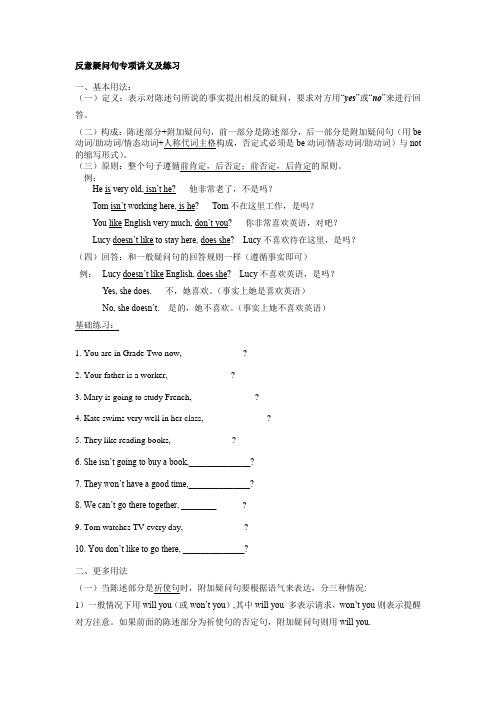
反意疑问句专项讲义及练习一、基本用法:(一)定义:表示对陈述句所说的事实提出相反的疑问,要求对方用“yes”或“no”来进行回答。
(二)构成:陈述部分+附加疑问句,前一部分是陈述部分,后一部分是附加疑问句(用be 动词/助动词/情态动词+人称代词主格构成,否定式必须是be动词/情态动词/助动词)与not 的缩写形式)。
(三)原则:整个句子遵循前肯定,后否定;前否定,后肯定的原则。
例:He is very old, isn’t he? 他非常老了,不是吗?Tom isn’t working here, is he? Tom不在这里工作,是吗?You like English very much, don’t you? 你非常喜欢英语,对吧?Lucy doesn’t like to stay here, does she? Lucy不喜欢待在这里,是吗?(四)回答:和一般疑问句的回答规则一样(遵循事实即可)例:--Lucy doesn’t like English, does she? Lucy不喜欢英语,是吗?--Yes, she does. 不,她喜欢。
(事实上她是喜欢英语)--No, she doesn’t. 是的,她不喜欢。
(事实上她不喜欢英语)基础练习:1. You are in Grade Two now,______________?2. Your father is a worker, ______________?3. Mary is going to study French, ______________?4. Kate swims very well in her class, ______________?5. They like reading books,______________?6. She isn’t going to buy a book,______________?7. They won’t have a good time,______________?8. We can’t go there together, ______________?9. Tom watches TV every day,______________?10. You don’t like to go there, ______________?二、更多用法(一)当陈述部分是祈使句时,附加疑问句要根据语气来表达,分三种情况:1)一般情况下用will you(或won’t you),其中will you 多表示请求,won’t you则表示提醒对方注意。
中考英语反义疑问句专项

英语“反义疑问句”专项复习一、反义疑问句的基本结构与形式反义疑问句(The Disjunctive Question) 即附加疑问句,是英语四大问句之一。
它表示提问人的看法,没有把握,需要对方证实。
句尾升调表示疑问,降调表示反问。
结构:1. 陈述部分肯定句+疑问部分否定句(可记为前肯后否)。
2. 陈述部分否定句+疑问部分肯定句(可记为前否后肯)。
如:①She often has lunch at school, doesn’t she? ①You don’t like sports, do you?二、反意疑问句通常对应规则一)、肯定+否定?否定+肯定?也就是前肯后否,前否后肯的原则。
如:①You can’t do it, can you? ①They are very late for the meeting, aren’t they?二)、反意疑问句中问句部分的动词与陈述部分的动词种类要对应一致。
如:①He has supper at home every day, doesn’t he? (不能用hasn’t he?)①They have known the matter, haven’t they? (不能用don’t they?)三)、反意疑问句中问句部分的动词在时态上应和陈述部分的时态一致。
如:①They will go to town soon, won’t they?(不能用don’t they?或aren’t they?)①He works very hard, doesn’t he?(不能用didn’t he?或won’t he?)三、反义疑问句的特殊用法1.祈使句后加一个反意疑问句,更加委婉。
肯定祈使句、否定祈使句后的反意疑问句通常只用will you。
但Let’s之后用shall we?。
除Let’s用shall we,其他都用will you。
2.陈述部分的主语是I’m,疑问部分要用aren’t I ? 如:I’m a student, aren’t I?3.陈述部分的主语是wish,疑问部分要用may I? 如:I wish to have a word with you, may I?4.陈述句部分主语是everything, something, anything, nothing时,其后的反意疑问句主语用it。
中考英语反义问句专题精讲
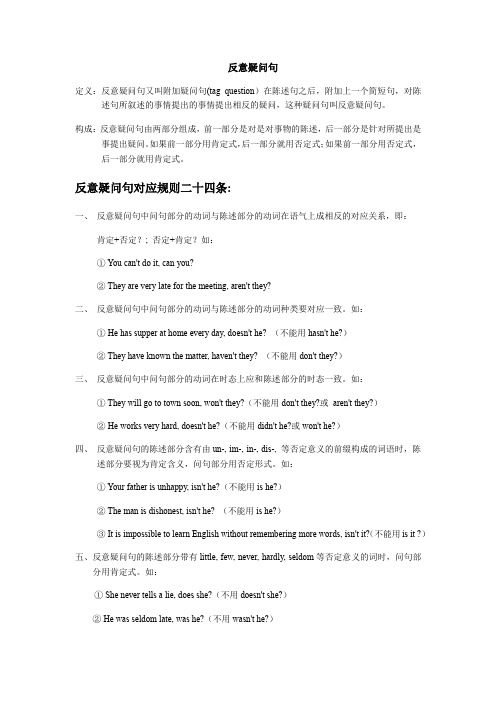
反意疑问句定义:反意疑问句又叫附加疑问句(tag question)在陈述句之后,附加上一个简短句,对陈述句所叙述的事情提出的事情提出相反的疑问,这种疑问句叫反意疑问句。
构成:反意疑问句由两部分组成,前一部分是对是对事物的陈述,后一部分是针对所提出是事提出疑问。
如果前一部分用肯定式,后一部分就用否定式;如果前一部分用否定式,后一部分就用肯定式。
反意疑问句对应规则二十四条:一、反意疑问句中问句部分的动词与陈述部分的动词在语气上成相反的对应关系,即:肯定+否定?; 否定+肯定?如:① You can't do it, can you?② They are very late for the meeting, aren't they?二、反意疑问句中问句部分的动词与陈述部分的动词种类要对应一致。
如:① He has supper at home every day, doesn't he? (不能用hasn't he?)② They have known the matter, haven't they? (不能用don't they?)三、反意疑问句中问句部分的动词在时态上应和陈述部分的时态一致。
如:① They will go to town soon, won't they?(不能用don't they?或aren't they?)② He works very hard, doesn't he?(不能用didn't he?或won't he?)四、反意疑问句的陈述部分含有由un-, im-, in-, dis-, 等否定意义的前缀构成的词语时,陈述部分要视为肯定含义,问句部分用否定形式。
如:① Your father is unhappy, isn't he?(不能用is he?)② The man is dishonest, isn't he? (不能用is he?)③ It is impossible to learn English without remembering more words, isn't it?(不能用is it ?)五、反意疑问句的陈述部分带有little, few, never, hardly, seldom等否定意义的词时,问句部分用肯定式。
中考英语语法复习反义疑问句

she ?/ hasn’t she?
2.do 助动词(用的 多)
2.have “生病,吃 she had a cold,didn’t she ? 根据实义动词选 喝玩乐,实义动 Tom has a bath,doesn’t he? 择对应的助动词
词”以及have to
英语专项:反义疑问句
have的用法
can’t they
You have never been to Beijing, ---Yes, I have. /No, I haven’t.
have you ?
34. ---Mr. Fat has few friends here, does he
?
---Yes, he does. /No, he doesn’t.
英语专项:反义疑问句 35 ---There is little milk in the bottle, is there ?
---Yes, there is. /No, there isn’t.
英语专项:反义疑问句
5.陈述部分含有否定前缀im-,dis-,un-和less等否 Alice is unhappy, isn’t 定后缀构成的派生词,附加疑问用否定形式。 she?
6.陈述部分是不定代词(物体)
Nothing is wrong with
something/anything/ everything/nothing等,疑问 the computer, is it?
反义疑问句用 had 前肯后否,
前否后肯。
英语专项:反义疑问句
4) 并列复句反意疑问句
反意疑问句的疑问部分一般与最接近的分句的主 、谓语保持一致。为了便于记忆,我们称之为就 近一致原则。
中考英语反义疑问句讲解及习题!
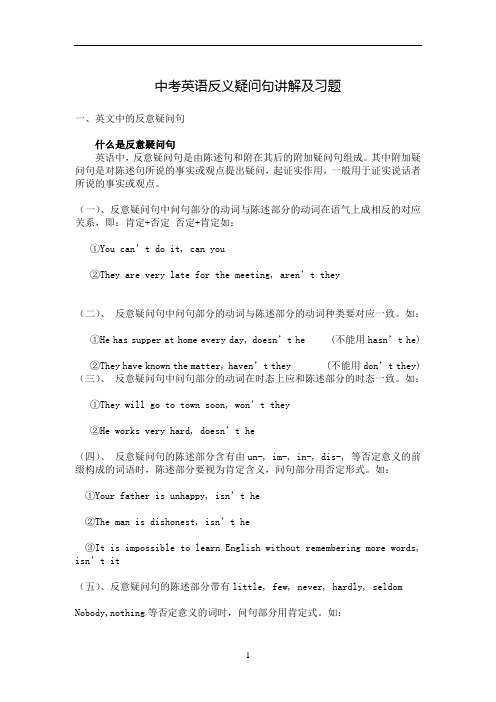
中考英语反义疑问句讲解及习题一、英文中的反意疑问句什么是反意疑问句英语中,反意疑问句是由陈述句和附在其后的附加疑问句组成。
其中附加疑问句是对陈述句所说的事实或观点提出疑问,起证实作用,一般用于证实说话者所说的事实或观点。
(一)、反意疑问句中问句部分的动词与陈述部分的动词在语气上成相反的对应关系,即:肯定+否定否定+肯定如:①You can’t do it, can you②They are very late for the meeting, aren’t th ey(二)、反意疑问句中问句部分的动词与陈述部分的动词种类要对应一致。
如:①He has supper at home every day, doesn’t he (不能用hasn’t he)②They have known the matter, haven’t they (不能用don’t they) (三)、反意疑问句中问句部分的动词在时态上应和陈述部分的时态一致。
如:①They will go to town soon, won’t they②He works very hard, doesn’t he(四)、反意疑问句的陈述部分含有由un-, im-, in-, dis-, 等否定意义的前缀构成的词语时,陈述部分要视为肯定含义,问句部分用否定形式。
如:①Your father is unhappy, isn’t he②The man is dishonest, isn’t he③It is impossible to learn English without remembering more words, isn’t it(五)、反意疑问句的陈述部分带有little, few, never, hardly, seldomNobody,nothing等否定意义的词时,问句部分用肯定式。
如:①She never tells a lie, does she (不用doesn’t she)②He was s eldom late, was he (不用wasn’t he)(六)、反意疑问句的陈述部分为I am……时,问句部分习惯上用aren’t I 表示。
中考英语语法复习系列之反义疑问句

若句子主语为some/any/every/no+thing等不定代词时,反义疑问句主语用it 若句中是some/any/every/no+body为主语时,反义疑问句主语用they
11
特殊结构四(宾语从句):
反义疑问句
宾语从句的反义疑问句 =陈述句(主句+从句)+附加疑问句? 附加疑问句的主语和谓语与主句一致。 1.We told him that we would go there next week, didn’t we? 2.He says he will come back next Monday, doesn’t he? 3.They don’t think that she will win, do they?
7
反义疑问句(二)
8
特殊结构一:
反义疑问句
She can hardly see anything, ___c_a_n__s_h_e___?
当陈述部分有hardly, rarely, seldom, few, little, no, never,nothing, nobody, nowhere等否定词或半否定词时,反义疑问句用肯定形式。
1
反义疑问句(一)
2
What a silly dog!
3
Here is my self-introduction!
①Hi, I’m Wangcai. ②I’m not Xiaoqiang. ③I can swim very well. ④But I can’t cook. ⑤I like eating bones. ⑥I don’t like cats.
13
反义疑问句
特殊结构四(宾语从句): 特殊
初中中考英语反义疑问句和祈使句详细讲解

反义疑问句一、反意疑问句的构成形式eg: John is kind, isn't he?约翰很和蔼,不是吗?eg: The man went away, didn't he?那个男人走开了,不是吗?eg: You have paid the gas bill, haven’t you你已经付了煤气费,不是吗?前肯后否:肯定陈述句+简略否定问句。
eg: She is not good at playing the violin, is she?她不擅长拉小提琴,是吗eg: They haven't been told the truth, have they?他们还没有被告知事情的真相,是吗?eg: He can' t read, can he?他不识字,是吗?前否后肯:否定陈述句+简略肯定问句。
二、反意疑问句的回答反意疑问句一般用yes或no回答,但要注意时态及人称代词的呼应。
在“前否后肯”的句子中,答语中的yes的含义为“不”,no的含义为“是”。
eg:-He is s a doctor, isn't he?他是医生,是吗?Yes, he is. 是, 他是医生No, he isn't. 不, 他不是医生eg:- -He isn' t a doctor, is he?他不是医生,是吗Yes, he is. 不, 他是医生NO, he isn't. 是, 他不是医生。
Yes, 表示陈述语序,表示肯定含义祈使句(1)第二人称作主语的祈使句第二人称作主语的祈使句通常省略主语you,用动词原形开头.eg: ( You)Get up quickly, or you'll be late for school.快点起床!否则你上学会迟到的。
eg: (You) Please come and meet my family.请来见见我的家人吧。
中考英语专题复习 反义疑问句知识讲解
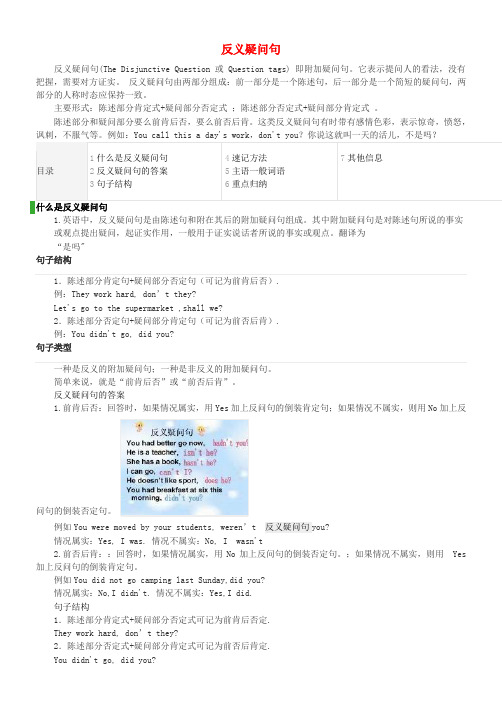
反义疑问句1.陈述部分肯定句+疑问部分否定句(可记为前肯后否).例:They work hard, don’t they?Let's go to the supermarket ,shall we?2.陈述部分否定句+疑问部分肯定句(可记为前否后肯).例:You didn't go, did you?句子类型一种是反义的附加疑问句;一种是非反义的附加疑问句。
简单来说,就是“前肯后否”或“前否后肯”。
反义疑问句的答案1.前肯后否:回答时,如果情况属实,用Yes加上反问句的倒装肯定句;如果情况不属实,则用No加上反例如You were moved by your stud ents, weren’t反义疑问句you?情况属实:Yes, I was. 情况不属实:No, I wasn't2.前否后肯::回答时,如果情况属实,用No加上反问句的倒装否定句。
;如果情况不属实,则用Yes 加上反问句的倒装肯定句。
例如You did not go camping last Sunday,did you?情况属实:No,I didn't. 情况不属实:Yes,I did.句子结构1.陈述部分肯定式+疑问部分否定式可记为前肯后否定.They work hard, don’t they?2.陈述部分否定式+疑问部分肯定式可记为前否后肯定.句子类型:一种是反义的附加疑问句,一种是非反义的附加疑问句。
简单来说,就是“前肯后否”或“前否后肯”。
编辑本段读法规则反义疑问句陈述部分用降调,问句部分可升可降。
提问者对陈述部分把握较大时,问句部分用降调;反之用升调。
速记方法前肯后否,前否后肯,前be后be,前无be后加助(do,have),时态一致。
主语一般词语附加疑问句中主语用和主句一致的主语,用主格。
附加疑问句随从句。
不定代词当陈述部分的主语是(1)用one时,后面的疑问句可用one/he.(2)用no one时,后面附加疑问句中主语用they。
中考英语反义疑问句讲解及练习题
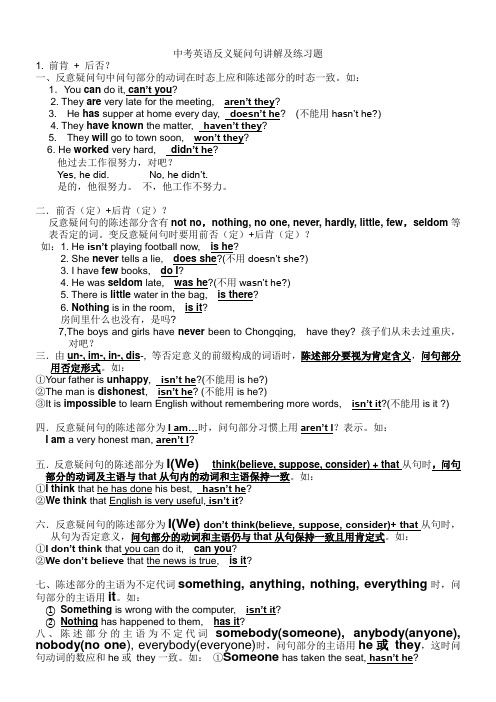
中考英语反义疑问句讲解及练习题1. 前肯+ 后否?一、反意疑问句中问句部分的动词在时态上应和陈述部分的时态一致。
如:1.You can do it, can’t you?2. They are very late for the meeting, aren’t they?3. He has supper at home every day, doesn’t he? (不能用hasn’t he?)4. They have known the matter, haven’t they?5. They will go to town soon, won’t they?6. He worked very hard, did n’t he?他过去工作很努力,对吧?Yes, he did. No, he didn’t.是的,他很努力。
不,他工作不努力。
二.前否(定)+后肯(定)?反意疑问句的陈述部分含有not no,nothing, no one, never, hardly, little, few,seldom等表否定的词。
变反意疑问句时要用前否(定)+后肯(定)?如:1. He isn’t playing football now, is he?2. She never tells a lie, does she?(不用doesn’t she?)3. I have few books, do I?4. He was seldom late, was he?(不用wasn’t he?)5. There is little water in the bag, is there?6. Nothing is in the room, is it?房间里什么也没有,是吗?7,The boys and girls have never been to Chongqing, have they? 孩子们从未去过重庆,对吧?三.由un-, im-, in-, dis-, 等否定意义的前缀构成的词语时,陈述部分要视为肯定含义,问句部分用否定形式。
中考反义疑问句 特殊句式-反义疑问句

中考反义疑问句特殊句式-反义疑问句专题复习-反义疑问句反义疑问句结构:前否后肯,或前肯后否1.当陈述句部分的主语是不定代词no one,none,nobody,everyone,someone,everybody,somebody 等时,其附加疑问句的主语强调全部时可用they,强调个体时用he.No one phoned me while I was out,did they?Everyone is having a good time, aren`t they?Someone is waiting for you,isn`t he?2.陈述句的主语是复合不定代词everything,anything,something,nothing,附加疑问句部分主语用it.Everything goes well with you,doesn`t it?Nothing has been considered about this meeting,has it?3.不定代词one作主语,附加疑问句的主语在正式场合用one,非正式场合用you.One can`t be too careful,can one/you?4.当陈述句的主语是指示代词,附加疑问句主语要用相应的人称代词,即this/that用it,these/those用they.That was a hundred years ago,wasn`t it?Those are yours,aren`t they?5.陈述句部分为there be句型时,其后附加疑问句部分仍用there.There will be a special meeting tomorrow,won`t there?There used to be a lake here,usedn`t/didn`t there?6.情态动词must在反义疑问句中的用法,应由陈述部分的意义来决定。
中考英语反义疑问句的14种常考特殊用法

中考英语反义疑问句的14种常考特殊用法一、反意疑问句反意疑问句是由陈述句和附在其后的附加疑问句组成。
其中附加疑问句是对陈述句所说的事实或观点提出疑问,起证实作用,一般用于证实说话者所说的事实或观点。
(表示说话者对某事有一定看法,但又不完全确定,需要对方加以证实。
)翻译为“是吗”二、反意疑问句的回答回答时,事实是肯定的用Yes;若事实是否定的则用No。
三、反意疑问句的特殊情况1.反意疑问句中问句部分的动词与陈述部分的动词在语气上成相反的对应关系,即:肯定+否定?否定+肯定?You can’t do it,can you?你不能做它,是吗?They are very late for the meeting,aren’t they?他们开会迟到了,是吗?2.附加问句的主语应与陈述句的主语保持一致,且只能用人称代词替代。
You come from Beijing,don't you?你来自北京,是不是?3.当陈述句中含有be动词,助动词,或是情态动词时,反问句部分由这些词加上主语人称代词构成:Be动词包括:am,is,are,was,were助动词有:do,does,did,have(用在完成时),has (用在完成时)等情态动词有:can,could,may,might,must,will,would,shall ,shouldHe will go home,won’t he?他要回家了,是吗?She doesn’t like to eat popcorn,does she? 她不喜欢吃爆米花,是吗?4.have的不同用法,反义疑问句用不同的动词(1)have表“有”时,反义疑问句谓语动词用have/do都行He has a new car,doesn’t/hasn’t he? (2)have表“吃,喝,玩,度过,举办”等是,反义疑问句谓语动词用doHe has supper at home every day,doesn’t he? They had a good time in Beijing,didn’t they?(3)have to表“不得不,必须”时,反义疑问句谓语动词用doKite has to help her mother,doesn’t she?(4)had better表“最好”时,反义疑问句谓语动词用hadWe had better go to school at once,hadn't we?(5)have用在完成时中,反义疑问句谓语动词用haveThey have known the matter,haven’t they? [6_副本.jpg]5.(1)反意疑问句的陈述部分带有little,few,never,hardly,seldom,nobody,nothing,no one,none,neither等否定意义的词时,问句部分用肯定式。
中考英语语法专题:反义疑问句讲解与练习

四、反意疑问句1、结构陈述句+简短问句Eg: He is a student, isn’t he?前肯后否2、原则①:前肯后否;前否后肯。
否定词有:few, little, hardly, never, no, not,Seldom, neither, nothing, none,nobody, no one,scarcely等,如果前面有这些词,后面就不加not.②:前面用be动词、助动词、情态动词,后面也一样.前面如果没有be动词、助动词、情态动词,就去借助动词do, does, did,借哪一个由前面的谓语动词决定。
③: 前后在人称、时态上要一致。
简短问句必须用缩写形式④: 前面主语是this/that; these/those,问句主语用it/they代替⑤:前面主语是人名,问句中用相应的she/he/they代替⑥: 前面主语是表示“物”的不定代词,问句中主语用it代替. ⑦:含有think, believe, suppose, imagine, expect等动词后接宾语从句构成的主从复合句在构成反意疑问句时,视情况不同有两种不同的构成方式。
A: 当主句的主语为第一人称时,其后的简短问句应与从句相一致。
Eg: I don't think he is bright, is he?主句从句与从句一致B:当主句的主语为第二、三人称时,其后的简短问句则应与主句相一致(此时,否定只看主句,与从句无关...)Eg:They don't believe she's an engineer, do they?主句与主句一致Everything goes well, doesn’t it ?LiMing can speak English, can’t he ?This isn’t your pen, is it ?3、固定的形式1).Let’s…………,shall we ?2). Let us…………,will you?3). 祈使句…………, will you ?附练习:变反义疑问句1. You are not going home.2. You have got a green pencil.3. She can swim.4. He came here by bike.5. This is his book.6. John has learnt about China.7. Lucy can draw beautiful pictures.8. It isn’t a nice watch.9.There is a little milk in the glass.10. Jenny and Bill play basketball together after school.11. His sister does eye exercises every day.12. It’s a fine day today.13. He will go to Chengdu tomorrow.14. Her father had lunch at home.15. There is little water in the bottle .16. Let’s have a long talk.17. Jenny has never been late for school.18. Lily never went to the zoo by bus last year.19. Jim had few friends there.20.Kate has little bread for breakfast.21. Open the door 22. You’ve never seen dinosaur eggs23. His sister had a bad cough24. Mr. Green went to Shenzhen on business last week25. Danny can hardly understand any Chinese26. Don’t smoke in the meeting-room27. Miss Cheng will never forget her first visit to Canada28. The lady couldn’t say a word when she saw the snake29. he'll go shopping30.You'd like to go with me31. There are few apples in the basket.32.He can hardly swim.33.They seldom come late.34. I don't believe that he can translate this book.35. Your sister supposes she needs no help.36. She doesn't expect that we are coming so soon.37.Don't make much noise.。
- 1、下载文档前请自行甄别文档内容的完整性,平台不提供额外的编辑、内容补充、找答案等附加服务。
- 2、"仅部分预览"的文档,不可在线预览部分如存在完整性等问题,可反馈申请退款(可完整预览的文档不适用该条件!)。
- 3、如文档侵犯您的权益,请联系客服反馈,我们会尽快为您处理(人工客服工作时间:9:00-18:30)。
专题训练----反意疑问句一、意义:反意疑问句是由两部分组成的,前一部分是对事物的陈述(即陈述句),后一部分是简短的提问(即简短疑问句),中间用逗号隔开。
二、特点:如果前一部分用肯定句,后一部分就用否定疑问句;如果前一部分用否定句,后一部分就用肯定疑问句。
两部分的人称和时态要一致。
三、回答:1、对反意疑问句的回答,无论问题的提法如何,都要根据事实来回答。
2、如果事实是肯定的,就用yes;事实是否定的,就要用no。
3、要特别注意陈述句部分是否定结构,反意疑问句部分用肯定式提问时,回答yes或no与汉语正好相反。
这种省略回答的yes要译成“不”,no要译成“是”。
例:—He likes playing football, doesn’t he? 他喜欢踢足球,是吗?—Yes, he does. / No, he doesn’t. 是的。
/ 不是。
—His sister didn’t attend the meeting, did she? 他妹妹没有参加会议,是吗?—Yes, she did. / No, she didn’t. 不,她参加了。
/ 是的,她没参加。
四、具体变化规则。
1、含be(is, are, was, were)动词的反意疑问句,需用be的适当形式.① You are from America, aren't you? Yes, I am. No, I'm not.② The Green weren't at home last night, were they? Yes, they were. No, they weren’t.注意:1、陈述部分主、谓语是I am...时,反意疑问句用aren't I ,而不是am not I (可用am I not)。
例如:I'm working now, aren’t I? 我在工作,是吗?2、行为动词的一般现在时的反意疑问句,需用do/does的适当形式。
① You often watch TV in the evening, don't you? Yes, I do. No, I don't.②The first class begins at eight, doesn't it? Yes, it does. No, it doesn't.3、行为动词的一般过去时的反意疑问句,需用did的是适当形式。
①The rain stopped, didn't it? Yes, it did. No, it didn't.② Jim’s parents didn't go to Hong Kong last month, did they? Yes, they did. No, they didn't.4、一般将来时的反意疑问句,需用will的适当形式。
① The boys will play games, won't they? Yes, they will. No, they won't.② It won't stop raining, will it? Yes, it will. No, it won't.5、现在完成时的反意疑问句,需用have、has的适当形式。
① You have been to Shanghai before, haven't you? Yes I have. No, I haven't.② Jack hasn't done his homework, has he? Yes, he has. No, he hasn't.6、含有情态动词的反意疑问句,需用情态动词的适当形式。
①You can speak French, can't you? Yes, I can. No, I can't.②The students must study hard, mustn't they? Yes, they must. No, they needn't.注意:当陈述部分含有情态动词must时,我们便要分析一下must的含义。
如果must 作“一定;要;必须”讲,反意疑问句须用mustn't或needn't;而当must作推测意义“一定是;必定”讲时,反意疑问句则需根据must后的动词原形选用相应的形式。
例如:He must work hard at physics, mustn't he? 他必须努力学物理,是吧?You must go home now, needn't you? Yes, I must. No, I needn't.Tom must be at home,isn't he? 汤姆一定在家,是吧?7、祈使句用于反意疑问句中这种类型较特殊,前一部分是祈使句,后一部分是肯定疑问形式。
回答也较灵活。
句型1: Let's + 动词原形+ 其它,反意疑问句用shall we?①Let's go for a walk, shall we?句型2: 其它形式的祈使句,(包括Let us),反意疑问句用will you(表示请求)或won’t you(表示提醒)?①Come into the classroom, will you? ②Please be careful, will you?③Be quick, will you? ④Don’t you be late again, will you?⑤Do it at once , will you? ⑥Let me have a try, will you?⑦Let us leave now ,will you?8、当陈述部分含有以下这些含有否定意义的词时:few, little, seldom,hardly, never, not, no, no one,nobody, nothing, none, neither等,其反意疑问句需用肯定结构。
例如:① You have never been to Beijing, have you? Yes, I have. No, I haven't.② Mr. Fat has few friends here, does he? Yes, he does. No, he doesn't.④ He could do nothing, could he? Yes, he could. No, he couldn't.但是,当陈述部分所含的否定词是通过加前缀或后缀构成的,其后的反意疑问句依然用否定结构。
例如:It is unfair, isn't it? It’s impossible , is n’t it ?9、感叹句。
感叹句后加反意疑问句时,其反意疑问句常根据其主、谓语来确定。
例如:①How time flies , doesn’t it ? ②How tall the buildings are , aren’t they?③How hard it’s raining, isn’t it ? ④What a tall man , isn’t he ?⑤What tall buildings, aren’t they? ⑥What an old picture, isn’t it?10、陈述部分的主语是everything, nothing, anything或something 时,反意疑问句的主语应用代词it。
例如:Something is wrong with my radio, isn't it? 我的收音机出毛病了,是吧?11、陈述部分的主语是everybody, everyone, anybody, anyone, somebody, someone, nobody, no one, none, neither 时, 其反意疑问句的主语需用复数代词they。
例如:Everyone is here, aren't they? 大家都到了,是吗?No one knows about it, do they? 没有人知道这件事,对吗?12、陈述部分的主语是指示代词this或that时,反意疑问句的主语用it,当陈述部分的主语是指示代词these或those时,其反意疑问句的主语用they。
例如:This is a plane, isn't it? 这是一架飞机,是吗?These are grapes,aren't they? 这些是葡萄,是吗?13、当陈述部分主语是从句、不定式(短语)、动词-ing形式时,反意疑问句的主语应该用it。
例如:What you need is more important, isn't it?你需要的东西更重要,是吧?14、当陈述部分含I think (believe, suppose...)that... 结构时,其反意疑问句须与从句的主、谓语保持一致,主句的主语必须是第一人称。
例如:I don't think he will come, will he? 我认为他不会来,对吗?I believe they can finish the work in time ,can they?15、have(has)不是“完成时态”时,其反意疑问句的助动词要用do, does, did。
例如:They had a meeting just now,didn't they? 他们刚才开了个会,是吗?You have to water the vegetables every day, don't you?你每天都要浇菜,对吧?He has to stay at home, doesn’t he? They had to start at once ,didn’t they?16、陈述部分是there be句型时,其反意疑问句中要用there。
例如:①There aren't any children in the room, are there? Yes, there are. No, there aren't.②There will be a basketball match tomorrow, won't there? Yes, there will. No, there won't.17、陈述部分有had better时,反意疑问句中要用had 。
